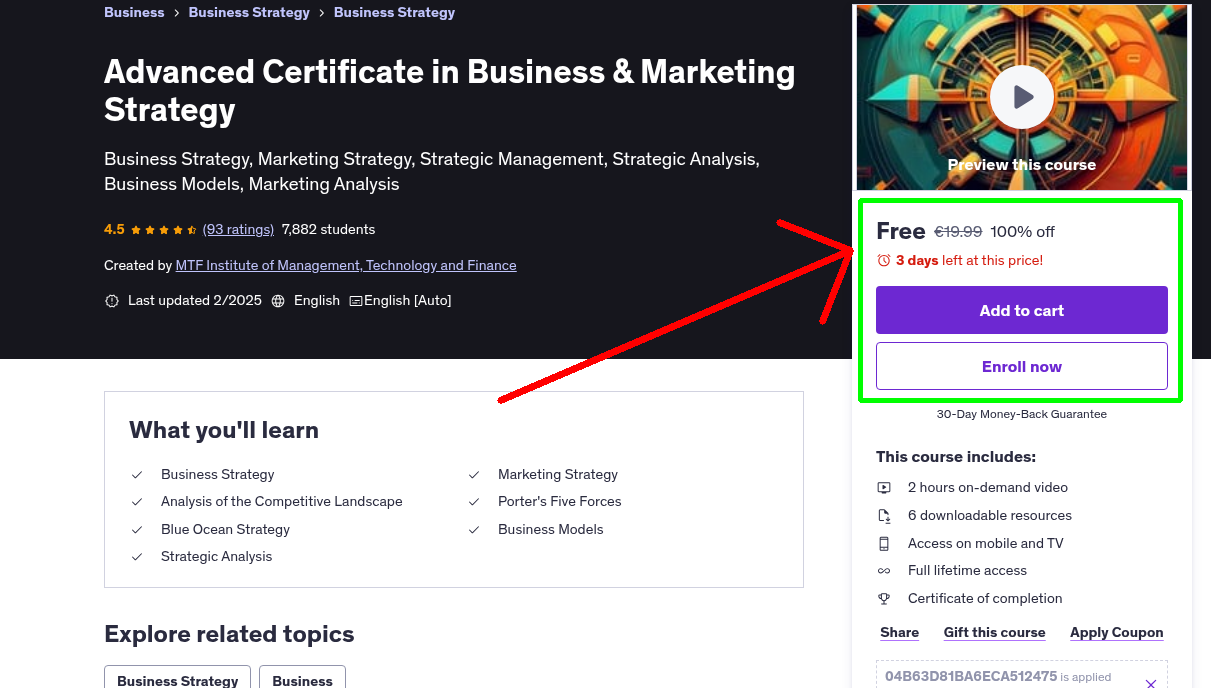
What You'll Learn
- Business Strategy
- Marketing Strategy
- Analysis of the Competitive Landscape
- Porter's Five Forces
- Blue Ocean Strategy
- Business Models
- Strategic Analysis
Requirements
- For a better learning experience we suggest you to use a laptop / mobile phone / pen and paper for taking notes, highlighting important points, use our guidebook and making summaries to reinforce your learning.
Who This Course is For
- No special requirements. Course for any who want to build a career at business or improve their knowledge.
- Business & Marketing Strategy: A Symbiotic Relationship for Success In the world of business, success hinges on a well-defined and effectively executed strategy. Two critical components of this strategy are business strategy and marketing strategy. While distinct, they are inextricably linked, working in synergy to drive an organization towards its goals.
- Business Strategy: The Big Picture Business strategy outlines the long-term goals and overall direction of an organization. It defines the company's vision, mission, and values, and determines how it will compete in the marketplace. A robust business strategy considers factors such as: Market analysis: Understanding the industry landscape, identifying opportunities and threats, and assessing the competitive environment. Target audience: Defining the specific customer segments the company aims to serve. Value proposition: Articulating the unique benefits the company offers to its customers. Competitive advantage: Identifying the factors that differentiate the company from its competitors and provide a sustainable edge. Resource allocation: Determining how the company will deploy its resources (financial, human, technological) to achieve its objectives.
- Marketing Strategy: Reaching the Customer Marketing strategy focuses on how the company will reach its target audience, communicate its value proposition, and build profitable relationships with customers. It involves: Market research: Gathering insights into customer needs, preferences, and behaviors. Segmentation and targeting: Identifying specific customer groups and tailoring marketing efforts to their unique characteristics. Marketing mix: Developing a comprehensive plan encompassing the 4Ps of marketing: Product: Defining the features, benefits, and quality of the offering. Price: Determining the pricing strategy to maximize profitability and competitiveness. Place: Selecting the channels to distribute the product or service to the target market. Promotion: Communicating the value proposition through various channels such as advertising, public relations, and social media. Brand building: Creating a strong and recognizable brand identity that resonates with the target audience.
- Why are these strategies important? Both business and marketing strategies are crucial for organizational success for several reasons: Clarity and focus: They provide a clear roadmap for the organization, aligning efforts and resources towards common goals. Competitive advantage: They enable companies to identify and capitalize on their strengths, differentiating themselves from competitors. Customer focus: They emphasize understanding and meeting customer needs, leading to increased satisfaction and loyalty. Sustainable growth: They lay the foundation for long-term success by anticipating market changes and adapting to evolving customer preferences.
- Developing these skills for career advancement Managers who possess strong business and marketing strategy skills are highly valued in today's competitive business environment. These skills are essential for: Strategic decision-making: Analyzing complex situations, evaluating options, and making informed choices that align with organizational goals. Leadership: Inspiring and motivating teams to execute strategies effectively. Problem-solving: Identifying challenges, developing creative solutions, and implementing them successfully. Communication: Clearly articulating strategies and their rationale to stakeholders.
- Interrelatedness of Key Concepts The concepts you mentioned are all interconnected and play vital roles in the development and execution of business and marketing strategies: Strategic Management: The overarching process of developing and implementing strategies to achieve organizational goals. Strategic Analysis: Evaluating the internal and external environments to identify opportunities and threats. Business Models: Defining how the organization creates, delivers, and captures value. Marketing Analysis: Understanding customer needs, market trends, and competitive dynamics. Competitive Landscape Analysis: Assessing the strengths and weaknesses of competitors. Porter's Five Forces: A framework for analyzing industry competitiveness. Blue Ocean Strategy: Creating new market space and making competition irrelevant.
Your Instructor
MTF Institute of Management, Technology and Finance
Institute of Management, Technology and Finance
4.4 Instructor Rating
101,718 Reviews
970,300 Students
274 Courses
Never Miss a Coupon!
Subscribe to our newsletter to get daily updates on the latest free courses.



